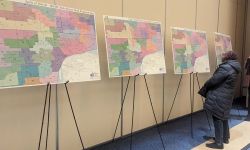Michigan redistricting panel to miss maps deadline. More lawsuits may follow.

Oct. 11: Michigan redistricting drafts could make state Senate a toss-up
Oct. 11: Michigan congressional redistricting drafts are done. Few incumbents are safe
Oct. 11: Republicans have edge, but Michigan House drafts include plenty of surprises
LANSING — Michigan's new independent citizen redistricting commission is poised to violate the state constitution when it blows past a Friday deadline to complete proposed congressional and legislative maps for public review.
The delay has already prompted one lawsuit that was dismissed Thursday by the Michigan Supreme Court. But observers are expecting additional lawsuits in a process that could be upended by legal challenges.
Supporters say the missed deadline is inevitable — and understandable — given a four-month delay in decennial census population counts that commissioners needed to begin drawing maps. That data, typically published in April, was released Aug. 12.
Related:
- Michigan redistricting panel saves metro Detroit for last. Is that a mistake?
- Confusion reigns over deadlines to redraw Michigan county commission maps
- Michigan redistricting commission’s latest challenge: attendance
Critics contend the deadline violation is symptomatic of larger dysfunction that threatens to undermine a new process to redraw political boundaries, a task that had previously been controlled by partisan lawmakers every 10 years.
"It's a pretty brazen disregard for the amendment, for the voters and for the people seeking to represent us at the ballot," said Tony Daunt, a Republican operative who sued to try to block the commission and is now executive director of FAIR Maps Michigan.
The citizen commission — composed of four Republicans, four Democrats and five self-identified independents — is required to complete and publish proposed maps by Friday in order to begin a 45-day public comment period ahead of final approval Nov. 1.
But the commission acknowledged months ago that it was not going to meet those mandated deadlines because of Census delays, even going so far as to petition the Michigan Supreme Court for preemptive relief, which was not granted.
Instead, the commission currently plans to publish proposed maps on Nov. 14, beginning the 45-day public comment period, and take a final vote to adopt the maps Dec. 30.
Voters Not Politicians, the group that organized the 2018 ballot initiative as an anti-gerrymandering crusade, "fully support the commission's extended deadline," executive director Nancy Wang told reporters Thursday.
She contended that rushing maps could jeopardize the most important work of the commission: creating fair districts that meet federal diversity rules, recognize “communities of interest” and avoid the kind of lopsided partisan advantage that has plagued maps drawn by politicians.
“We really are witnessing history,” Wang said. “This is what the people voted to put in place. Has it been without hiccups? No, of course not. The expectation was not that 13 citizens who occupy these seats would do everything perfectly. We know that politicians don’t do things perfectly.”
One map done… sort of
Commissioners celebrated a milestone Wednesday when they finished drawing their first draft map of state Senate districts, a collaborative process that spanned several day-long meetings that were live streamed for any citizen or interested party to observe.
“It’s a draft — and I don’t want everyone to get all excited — but we have completed our first full Senate map, which is awesome,” Commissioner Cynthia Orton, a Battle Creek Republican, said to applause from colleagues and staff.
But commissioners are behind their own schedule and still have much work ahead: They have not yet finished redrawing the 110 state House districts and on Thursday began mapping congressional districts, a task they had originally planned to start in late August.
The congressional map making is expected to be one of the most closely watched aspects of their work because Michigan is losing one seat in the nation’s Capitol due to sluggish population growth. Commissioners will be turning 14 districts into 13, a process that will inevitably lead to at least one incumbent lawmaker losing his or her seat in the 2022 election.
And even the draft state Senate maps completed Wednesday are not actually done.
The commission is scheduled to revisit those district boundaries later this month to try and ensure partisan fairness, a requirement of the constitutional amendment members have not yet considered in a process that has so far focused on population, diversity and communities of interest.
Still, the commission expects to meet its own Nov. 14 deadline for publishing proposed maps as part of “an inaugural, open and transparent effort,” spokesperson Edward Wood told Bridge Michigan.
“Instead of rushing to meet flexible timelines, the commission remains intentional in following the seven ranked redistricting criteria and considering public comment,” he said in an emailed statement. “Knowing this process is new, we allowed for additional time, if necessary, to draw maps.”
The map making process should take time, Wang said Thursday, and Voters Not Politicians is urging commissioners to schedule additional meetings -- or simply work longer hours -- to make sure they have enough time to analyze the partisan fairness of maps.
“You have to tackle it head on."
Lawsuits and transparency complaints
The independent commission's plan to miss constitutional deadlines because of the Census delays has already prompted one lawsuit, and experts predict others may soon follow.
Serial litigant Robert Davis of Highland Park last week urged the Michigan Supreme Court to order the commission to meet the constitutional timeline, including Friday's deadline to publish maps for public comment.
But the state's highest court rejected that challenge Thursday, ruling Davis' suit was not yet "ripe" because it anticipated the commission missing deadlines that had not yet arrived.
Justice Beth Clement, a Republican appointee, disagreed with the decision.
"We owe it to the voters who ratified this proposal to give them everything to which they are entitled," she wrote in a partial dissent. "That includes proposed maps by Sept. 17, and adopted maps by Nov. 1."
In his suit, Davis argued the commission "has chosen to deliberately ignore the clear mandate" set forth in the Michigan Constitution.
The deadlines, he wrote, "are necessary to ensure that interest parties have time to challenge the plans adopted by the defendant and they also ensure that potential candidates have adequate time to obtain the requisite number of signatures in their respective new districts."
Davis, who indicated he was considering a run for the U.S. House, echoed arguments from political consultants who contend mapping delays are unfair to would-be candidates contemplating whether to run for public office without knowing what their potential districts will look like.
"It's tough to have sympathy for politicians — no doubt — but they do have to decide: are they going to run? Do they have to move to run? What is that seat going to look like?" said Daunt, a longtime GOP strategist who is monitoring the redistricting process.
Daunt told Bridge Michigan his FAIR maps group is not planning an immediate lawsuit over Friday’s missed mapping deadline but is not ruling out the possibility of future litigation.
While the commission is facing legal pressure to finish maps, some observers are urging them to take additional time to make sure they do it right.
And even supporters are urging them to do so in a more transparent manner.
The commission live streams its meetings, but it has often delayed publishing meeting minutes. Likewise, the commission has been slow to publish its mapping work online. And when it does post mapping information, it is in the form of "shape files" that are inaccessible without specialized software.
Transparency and accessibility is necessary to ensure trust in the process, Ken Whittaker of Michigan United, a civil rights organization, told commissioners at their Thursday meeting.
"The Senate map released last night was in a format that has a very steep learning curve," Whittaker said.
"The only way to see what you've been working on and see the process is to sit through each and every meeting in its entirety, and that's not a fair or equitable process for the public to weigh in."
Voters Not Politicians, the group that organized the 2018 ballot initiative to create the commission, is urging the commission to post full maps online as it creates them.
But overall, Wang said, commissioners appear to be doing "a phenomenal job."
"This is a huge task that they're undertaking," she said of the mapping process. "And we're undertaking this as a state. It's not just on these 13 people's shoulders."
See what new members are saying about why they donated to Bridge Michigan:
- “In order for this information to be accurate and unbiased it must be underwritten by its readers, not by special interests.” - Larry S.
- “Not many other media sources report on the topics Bridge does.” - Susan B.
- “Your journalism is outstanding and rare these days.” - Mark S.
If you want to ensure the future of nonpartisan, nonprofit Michigan journalism, please become a member today. You, too, will be asked why you donated and maybe we'll feature your quote next time!




